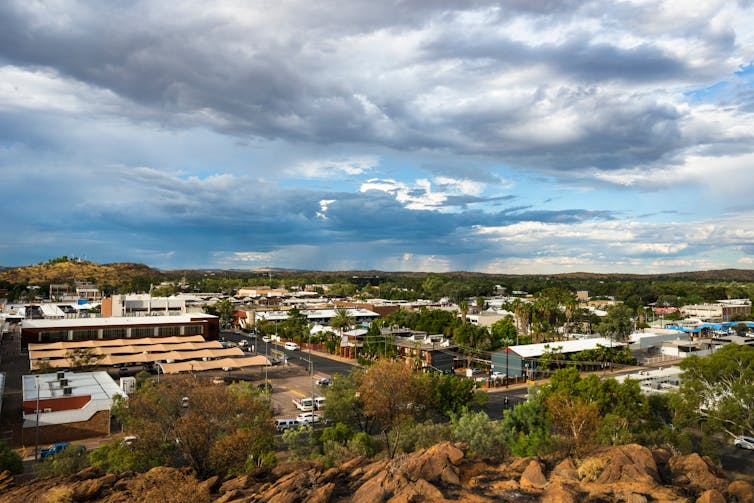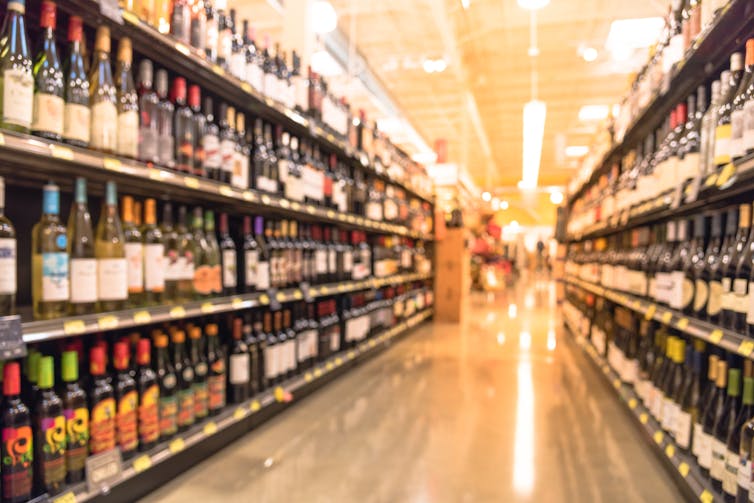
Lorelle Holland, The University of Queensland; Andrew Smirnov, The University of Queensland; Natasha Reid, The University of Queensland; Nicole Hewlett, The University of Queensland, and Tylissa Elisara, The University of Queensland
Alcohol management in Aboriginal and Torres Strait Islander communities has been a deeply divisive issue, as seen recently in Alice Springs in the Northern Territory.
Indigenous leaders called for and welcomed emergency restrictions on the sale of alcohol from January 24 2023.
This approach resulted in an immediate decrease in alcohol-related harms, including family violence and emergency department presentations.
But Elders in Alice Springs have warned these restrictions “should not let governments off the hook” from addressing the underlying social determinants of alcohol-related harm.
This reflects a long-standing community concern that prohibition alone does nothing to address issues such as intergenerational trauma, poverty, housing, education, unemployment, access to alternative activities, access to adequate health care and racism.
Critics of government-imposed alcohol management argue the allocation of resourcing is too strongly weighted toward supply reduction – and especially law enforcement – with inadequate funding of demand-reduction and harm-reduction strategies.
Our commentary, published this week in the Lancet Western Pacific Regional Health, highlights the need for culturally responsive approaches to alcohol in remote communities. Reductions in alcohol use are linked with the strength of culture, empowerment and community.
Incorporating Aboriginal culture
Australia’s National Drug Strategy outlines three ways to address alcohol-related harm, by reducing:
demand – preventing people taking up drinking or delaying starting, providing education, and offering treatment services
supply – reducing alcohol availability and greater policing
harm – encouraging responsible service of alcohol and providing services such as sobering-up shelters that reduce harm for people who are intoxicated.
But development and implementation of these strategies has overlooked culturally responsive approaches to meet the needs of Aboriginal and Torres Strait Islander peoples. One such approach is the “interplay wellbeing framework”.
The interplay wellbeing framework is based on Indigenous concepts of wellbeing and positions risky alcohol use in the context of systemic inequities across all the social determinants of health, including housing, education, employment and wealth.
Such approaches show how government and communities can work together in a shared and respectful space to progress the National Drug Strategy.

Non-drinkers and risky drinkers
Overall, Indigenous Australians are more likely to be non-drinkers (15.4%) compared to non-Indigenous people (7.9%).
But alcohol-related harm has been very destructive for many Indigenous communities. In 2018, alcohol accounted for 10.5% of the total burden of disease and injury for Indigenous Australians. This harm is preventable.
Risky levels of alcohol use for Indigenous Australians are often due to the ongoing negative impacts of colonisation. This includes intergenerational trauma, which manifests as poor psychological wellbeing and is sometimes interlinked with risky alcohol consumption.
How alcohol harms
According to the National Alcohol Strategy 2019–2028, many people who drink at risky levels don’t consider themselves as heavy drinkers. Nor do they identify alcohol use as a cause of cancer, heart disease, stroke, liver disease and gastrointestinal disorders.
Social harms related to alcohol use include physical assaults, injuries, child neglect and abuse, suicidal thoughts, partner violence and crime. Lives are lost prematurely to family violence, homicide, suicide and accidents.
The costs of alcohol-related social harm are estimated at A$66.8 billion dollars in Australia from 2017–2018.
Alcohol industry is a barrier to reducing harms
The alcohol industry uses excessive advertising to promote alcohol as a safe product. The DrinkWise program, for instance, is funded by the alcohol industry. It seeks to blame the consumer as an irresponsible drinker. This reduces the need for the alcohol industry to take responsibility for its harmful product.
Harm-minimisation strategies need the genuine support of the alcohol industry if they are to effectively reduce alcohol use and respond to the impact of serious injury, violence, illness and disease related to alcohol use.
But to date, the alcohol industry has capitalised on the challenges communities face. It provides easy access alcohol outlets in areas of lower socioeconomic status. This exploitative practice increases the risk of alcohol-related harm to people living in these areas.

Healing through culture
Indigenous-led approaches to alcohol-related harm promote holistic wellbeing and draw on the healing qualities that Aboriginal culture offers. This is an effective way of alleviating intergenerational trauma and interrelated alcohol harm.
Community-level healing- and trauma-informed approaches can overcome barriers such as racism that prevent people accessing health and social support systems.
However, they need to be adequately funded and resourced. Culturally responsive healing approaches need to be community-, evidence- and theory-informed and inclusive of both traditional healing and western methodologies.
How the model can work
The value of culture on Country has been demonstrated through a healing model of care for promoting effective rehabilitation.
Orana Haven Drug and Alcohol Residential Rehabilitation Service is a three-month program that combines 12-step treatment with residential treatment facility focusing on:
- healing through culture and Country
- emotional safety and relationships
- strengthening life skills
- improved wellbeing.
Information collected through semi-structured interviews found that embedding culture and being on Country enhanced participants’ feelings of connection, identity and spirituality.
Indigenous leadership and self-determination
Culturally responsive approaches require Indigenous leadership and culture to counter the harms associated with alcohol use.
This ensures the healing process can privilege resistance, resilience, interpersonal relationships and strengths. Incorporating a holistic view of community and culture can facilitate mutually respectful collaboration and self-determination – and lead to sustained change. ![]()
Lorelle Holland, PhD Candidate, The University of Queensland; Andrew Smirnov, Senior Lecturer, The University of Queensland; Natasha Reid, Research Fellow, The University of Queensland; Nicole Hewlett, Project Manager, The University of Queensland, and Tylissa Elisara, Senior Aboriginal and Torres Strait Islander Research Officer and Tutor, The University of Queensland
This article is republished from The Conversation under a Creative Commons license. Read the original article.



